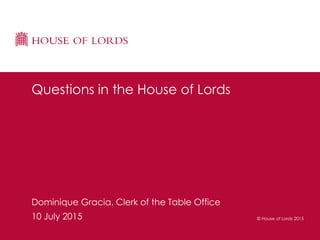More Related Content
More from UK Parliament Outreach and Engagement Service
More from UK Parliament Outreach and Engagement Service (20)
House of Lords PQs July 2015
- 1. © House of Lords 2015
Dominique Gracia, Clerk of the Table Office
10 July 2015
Questions in the House of Lords
- 2. © House of Lords 2015
Table Office: x3036, minute@parliament.uk
• Dominique Gracia, Elspeth Jones and Sarah Kerr
• Rotating band of “minute clerks”
• Clerk Assistant
• Process business tabled up to 6pm each sitting day
• Publish House of Lords Business overnight every
sitting day
• Handle Questions for Written Answer transfers
between departments
- 3. © House of Lords 2015
Types of questions
• Oral questions (‘ordinary’ and ‘topical’)
• Questions for short debate (‘ordinary’ and
‘topical’)
• Questions for written answer, to:
– Her Majesty’s Government
– Leader of the House
– Chairman of Committees
• Private notice questions
• Secretary of State questions (not currently in
operation)
- 4. © House of Lords 2015
Principles for all questions
Set out in the Companion to Standing Orders
(available online):
• Seek information on matters of HMG responsibility
• Should:
– Be neutral and factually accurate
– Not be hypothetical
– Be answerable in 75 words (oral)/500 words
(written)
– Not ask for legal interpretation or comments on
matters sub judice
– Not cast aspersions on the Crown
… Self-regulating
- 5. © House of Lords 2015
Oral questions
• Ordinary
– ‘Slots’ available 4 weeks in advance
– Question time is 30 mins at start of business: 7.5
minutes per Q
– Answer (75 words) followed by supplementary
Qs
• Topical: 4th Q on Tuesday, Wednesday and
Thursday
– Ballot open for 2 working days
– Qs drawn 2 working days before being asked
– Topicality: what’s new? could it wait?
– “The Clerks discourage members from tabling
questions which are clearly not topical”
Companion, para 6.33
- 6. © House of Lords 2015
Questions for short debate
• Ordinary
– Added to list upon request
– Tabled for debate by GWO (roughly) in order
– “Dinner break” (1hr), last business (1.5hrs), Grand
Committee (usually 1hr)
– Minister’s reply: (last) 12 minutes
• Topical
– Thursdays between two longer debates
– Ballot opens 10am on Monday, drawn midday
on Tuesday the week before debate
– Two items of national press coverage in four
days prior
- 7. © House of Lords 2015
Questions for written answer
• Limits: 6 per day, 12 per week
• Answers:
– Within 10 working days via Q&A system;
“naughty list”
– Transfers between departments should be
notified to the Table Office ASAP
– Withdrawals (by members) also processed by
the Table Office
– Published online immediately (later in Hansard)
– Sent to member via email immediately
- 9. © House of Lords 2015
Private Notice Questions
• Approximately 10 allowed per session
• Urgent and important
• Lord Speaker decides; consultation, but no appeal
to the House
• Decision taken by 12 noon; question asked at 3 to
3.30
• Timing: 10 minutes, after oral questions
• Proceedings: much the same as other oral
questions
• Repetition of Commons Urgent Questions uses
same rules (i.e.10 minutes, not 40)
- 10. © House of Lords 2015
Secretary of State questions
(currently not in operation)
• Timing: One Thursday a month, after oral questions
• 3 questions, 20 minutes
• Tabling: ballot drawn on the Monday
• Proceedings: same as other oral questions

